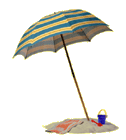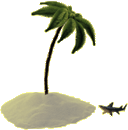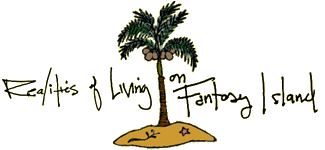 |
 |
 |
|
|||
|
Realities of Living on Fantasy Island There was nothing urgent to do this morning so I decided to go for a bike ride around the island. I pass the usual island landmarks: the elephant trek, monkey theatre, crocodile farm, butterfly garden, snake show and the ubiquitous monkey-working-coconut. When I get to one of the tourist towns a German man, drunk already at eleven in the morning, calls out from a thatch roofed restaurant as I ride past him. "Cha cha", he says, the Thai word for slowly. I look at my bicycle speedometer. Zero it reads, and the odometer reads the same. Something has gone wrong with my little bike computer since we arrived on the island, so I can pedal and pedal but it never registers a speed or distance traveled. In a way, that's how everything on the island works. You pedal and pedal and you end up in exactly the same spot. 
Some months ago I met an Australian who had lived in this same tourist beach town for seven years before leaving for Bangkok. "No one," he told me, "will have any sympathy when you tell them that living on a tropical island is not paradise." I didn't want to believe him, not about the sympathy part, but that living here wasn't paradise. My husband and I had been coming to Koh Samui on holiday for the last ten years. It was the perfect antidote to our hectic lives in Los Angeles. It was a place to sit on a beach all day, to watch sunsets and eat good food, and most importantly, feel completely disconnected from the rest of the world. Every time we returned to the States, we told ourselves we would be back, and eventually we would live here. We dreamed about it for so long, in fact, that it almost became an annoyance, like a mosquito buzzing about your ear that you can never quite catch. But one afternoon last August we just decided it was now or never. A house and children seemed the next logical steps for us and we could imagine the rest of our lives being dictated by those two things. The island would retreat into memory and we would always wonder what it would have been like. So we spent the next five months extricating ourselves from Los Angeles to come to the island, to live our dream. There are moments that are just as we had dreamed they would be. A day spent at a waterfall in the jungle, swimming in a pool surrounded by trees and vines and butterflies, an afternoon on the beach when we didn't see a single other person. The view from our front porch of the full moon silhouetting the leaves of a coconut palm. But everyday life on the island, like everyday life anywhere, is not paradise. After the sun sets and the moon rises... nothing happens. The pleasure of doing nothing can only be enjoyed for so long and that cut-off-from-the-rest-of-the-world feeling that had been so lovely on holiday seems pretty lousy as a lifestyle. 
We hadn't imagined what it would be like to live without a telephone, television, radio or even a proper address for postal service. After a couple of weeks it starts to feel like we are marooned, at the end of our road with nothing to do but sit on the front porch, watch fireflies and argue with each other. I worry about our relationship, think maybe we have blundered and made a rash decision. We had nothing to prepare us for spending twenty fours hours a day together. But as the only English speakers on our street, we didn't have much choice. We hadn't realized just how much we would depend on each other, so far from anyone else we knew. So the significance of every dispute becomes exaggerated, colors everything else until paradise seems hostile. There is nothing to distract us. No one to call for reassurance. There is only the sound of crickets We have decided to get a telephone. The utility company said it would take only ten days to hook up. Six weeks later we are still waiting. I begin making a daily pilgrimage on my bicycle to the telephone office. I am always met with a smiling reassurance that it will be done tomorrow, or maybe next week. My visits have the same effect on the telephone company as on my odometer: no change. The telephone has become something of a Holy Grail, a small, plastic implement that will reconnect us with the outside world. In its absence we read back issues of Wired magazine, hoping we will somehow feel connected through the very fibres of the pages. We seek out the advice of an American who has been living on the island for many years. How had he managed to stay sane for all that time? "Got off the island," he says. "I am never here for more than a month at a time." He specializes in explosives, traveling around to backwaters of the world, blowing up the bottoms of oil wells to get the oil flowing. As far as the phone, he says, "pay your bribe." He explains who to pay and where and the happy fact that the rate has gone down from a $1,000 to a mere $400. So we resolved to pay the very next morning, one day before the long Thai New Year holiday will turn every potential telephone connecting worker into a whiskey drinking reveler who couldn't care less about our uncomfortable sense of isolation. 
But the gods of paradise smile on us, and before we can count to four hundred, a Thai man arrives early the next morning despite the pouring rain, shouting "Torasup" - 'telephone'. No bribe required. For the next week we revel at the miracle of email coming directly to our house. The island seems sunnier, the locals friendlier. I make a hobby of inspecting the insects that pass through our windows and doors. There are maroon dragonflies, praying mantises, fireflies that illuminate a whole room, centipedes that curl up when you touch them and can be sent flying like hockey pucks across the floor. My favorite insect visitor is one that looks like a flying stick. She arrived in the kitchen one morning carrying a male on her back. They spent the next three days moving slowly across the floor and out the window, engaging in a marathon mating session. Three days here can be a very long time. In Los Angeles I dreamed about time slowing down. Indeed it has, so that when it rains, we stop what we are doing and sit on the front porch for an hour watching the sky turn dark and the palm trees swaying in the wind. We settle into a daily routine of riding the emotional roller-coaster that is our life on the island. In the morning we take a walk, greet the elephants and the lizards, enjoy the light and the relative cool and wonder why we would ever leave this place. Then round about four in the afternoon despair creeps in. We become drenched in sweat from strenuous tasks... like sitting or typing. I try to conjure up stories to sell to editors, but headlines like Village Dogs Reaffirm Ancient Bonds with Nightly Howling Ritual or Chicken Narrowly Avoids Head-on Collision with Motorbike just don't play well to American markets. So we watch our savings dwindle and feel our stomachs drop out as the roller coaster lurches on. From our vantage point we can see no safety net and even the telephone is powerless to change that. The island we fell in love with was a budget traveler's paradise but the reality is the influx of five star hotels has driven up the price of everything. It's hard to enjoy paradise when you are worried about money. The other expatriates on the island have no good advice to offer on this subject. Most of them are refugees in a way, fleeing strict drug laws or bad marriages, failed businesses, loneliness or the ennui of life. They live in a kind of happy, laid-back poverty that makes us feel like a couple of misfits. 
Like the Australian who warned me about life on the island. We are thinking about moving to Bangkok. Along with millions of villagers living around the country, we dream of the opportunities the city offers. There is no denying that this roller coaster ride through paradise has made us feel more alive, made us think that more things in our life are possible. But I wonder, do people back home in the suburbs know something we don't? After three hours of pedaling in the tropical sun and three liters of water, I arrive at exactly the same place where I started. I have seen the hills of the mainland in the west and the horizon that stretches toward Cambodia in the east. But according to my odometer I haven't moved an inch. I stop for a cold coconut at one of the port town's most popular restaurants. It is called Will Wait. Perhaps it is run by the telephone company. For The Savvy Traveler, this is Anne-Marie Ruff in Koh Samui, Thailand.
|
 | American Public Media Home | Search | How to Listen ©2004 American Public Media | Terms of Use | Privacy Policy |
